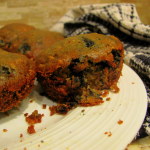 My mother tells a story about my childhood where she is standing in the kitchen, preparing dinner. I stand below her, tugging at her shirt, and begging for food.
My mother tells a story about my childhood where she is standing in the kitchen, preparing dinner. I stand below her, tugging at her shirt, and begging for food.
“I’m hungry”, I say, according to her recollection of that moment and many others like it; she says that as a child I was always preoccupied with food. My constant yearning for something munch got to the point where every time she tried to cook dinner, I’d follow her to the kitchen, like a hungry dog, and persistently beg for food. I was insatiable, she claims. But, as an adult looking back I wonder, insatiable for what?
I remember that moment, but from the third person perspective. So I wonder if it’s as past events sometimes go, where the telling of a memory from an outsider’s perspective serves to reshape it in the imagination. I can feel the emotions, however, watching my 4-year old form tugging on my mother’s clothing, her body towering over me, her face far away. She stands at the stove. I remember feeling full of… what was that yearning? Was it for food? Was it hunger for physical sustenance or nutrition from some other source? I wonder if the constant, nagging hunger was an articulation, in 4-year old vocabulary, of the need for something else: attention, affection or reprieve from boredom. I remember being told at one point that my favourite show was on and felt some of the anxiety of missing what I was lacking dissipate: a clue.
As a child, adults occupy the gateway to food. As adults, the gateways take on another form. Perhaps it is anxiety about body shape or the guilt of knowing that eating too much of a certain kind of thing isn’t nutritious. Perhaps the barrier to sustenance is financial. However, when I stand now in the kitchen, bent over the fridge, arm slung over the open door, contemplating a snack, I know that I am making a choice. And, for myself, as for many others, it’s not always clear whether the call to eat is hunger and physiologically based.
In the west, we have an abundance problem. More and more adults are reaching obese proportions. Metabolic diseases of excess like diabetes and cardiovascular disease are increasing and more and more women are experiencing the hormonal dysregulation that can come from carrying more body fat.
While I don’t recommend aspiring to the emaciated standard that we see plastered on magazines, Pinterest ads or runways, I do think that, for many people, balancing energy intake with energy output could be beneficial for optimal health and hormonal signalling. Body fat is metabolically active. It also stores toxins and alters that way our body metabolizes and responds to hormones, insulin being just one example, estrogen being another. Therefore, conditions like PCOS, infertility, diabetes, PMS and dysmenorrhea, or certain inflammatory conditions might benefit from a certain amount of weight loss.
An addition here: this post is not about body-shame or even necessarily about weight loss per se. It’s about overcoming emotional eating patterns that might even derive from the same disordered patterns that manifest in anorexia or bulimia. The goal of this post is to bring more awareness to how we operate within the complex relationships many of have with food and with our own bodies.
There are many reasons why we eat and physiological hunger is only one of them. Tangled up in the cognitive understanding of “hunger” is a desire for pleasure, a desire to experiment, to taste, to experience a food, to share with family and friends, to enjoy life. There are also deeply emotional reasons for wanting food: to nurture oneself, as reward, to combat boredom and to smother one’s emotions like anxiety, depression, ennui, yearning for something else— we often eat to avoid feeling.
Health issues aside, I believe that Emotional Eating (as it’s so-called) is problematic because it dampens our experience of living. By stuffing down our emotions by stuffing our faces we prevent ourselves from feeling emotions that it might be beneficial for us to feel in order to move through live in ways that are more self-aware, mature, self-developed and meaningful. While some emotional reasons to eat might be legitimate (acknowledging your beloved grandmother’s hard work by having a few bites of her handmade gnocchi, for instance), many of the reasons we eat linger below the surface of our conscious mind, resulting in us suffering from the consequences of psychological mechanisms that we are unaware of. I believe in making choices from a place of conscious awareness, rather than a place of subconscious suffering.
In heading directly into the reasons I am tempted to emotionally eat, I’ve learned quite a lot about myself. I’ve ended up eating less, as I’ve become more aware of the non-hunger-related reasons that I reach for a snack, but that doesn’t have to be the end goal for everyone. I believe that just understanding ourselves through uncovering and analyzing the emotions that influence our everyday behaviours can have life-changing effects; it allows us to know ourselves better.
As I work through the process of understanding why I overeat, I’ve realized there are a few steps to address. I believe that there are layers to the reasons we enact unconscious behaviours and first, it is important to untangle the physiological from the emotional reasons for eating, understand what real hunger feels like, address the “logical” reasons for overeating and then, when ready, head straight into the emotions that might cause overeating to occur
- Distinguishing between physiological hunger and emotional hunger:
The first step, of course, is to distinguish between physiological/physical hunger—the body’s cry for food, calories and nourishment—and emotional hunger. Typically, physiological hunger comes on slowly. It starts with a slow burn of the stomach, growling, a feeling of slight gnawing. It grows as the hours pass. For some it might feel like a drop in blood sugar (more on this later): feeling lower energy, dizzy and perhaps irritable. Physiological hunger occurs hours after the last meal, provided the last meal was sufficient. Usually, if one drinks water at this time, the physiological hunger subsides and then returns. Essentially, eating a meal or snack will result in the hunger vanishing and returning again still hours later.
Emotional hunger, however, is different. It starts with an upper body desire to eat. It might be triggered by commercials, social situations, or certain strong emotions. There might be cognitive reasons to eat (“I might be hungry later” or, “Oh! We’re passing by that taco place I like!”) that are not directly guided by the physical desire for sustenance. Emotional eating is often felt in the mouth, rather than the stomach. It might be brought on by the desire to taste or experience the food, rather than to fill oneself. The cravings might be specific, or for a certain food-source, such as cookies (this is not a hard and fast rule, however). Emotional hunger does not vanish from drinking water. Emotional hunger comes on suddenly, and is often not relieved by eating the prescribed amount of food (having a full meal); oftentimes we finish lunch only to find ourselves unable to get the cookies at the downstairs coffee shop out of our heads.
2. Settling hormonal reasons for overeating: serotonin, insulin, cortisol:
Not all physiological hunger, however, is experienced as the slow, gnawing, slightly burning, grumbling stomach sensation described above. Sometimes we experience the need to eat because our blood sugar has crashed, or our neurological needs for serotonin have gone up. We might eat because stress hormones have caused blood sugar to spike and then crash. We might also experience certain cravings for food because our physiological needs for macronutrients; like carbs, fat or protein; or micronutrients, like sodium or magnesium, have not been met.
Therefore, it becomes essential to address the hormonal imbalances and nutritional deficiencies that might be causing us to overeat. Oftentimes, getting off the blood sugar rollercoaster is the first step. This often involves a combination of substituting sugar and refined flours for whole grains, increasing fats and protein, and, of course, avoiding eating carbohydrate or sugar-rich foods on their own. It often involves having a protein-rich breakfast. I tend to address this step first whenever my patients come in and express feeling “hangry”: irritable and angry between mealtimes.
Often drops in brain-levels of serotonin cause us to crave carbohydrate-rich foods. This is very common for women experiencing PMS. In this case, balancing hormones, and perhaps supplementing with amino acids like l-glutamine, tryptophan and 5-HTP, can go a long way.
One of the questions I ask my patients who crave a snack at 2-3 pm (a mere 2-3 hours after their lunchtime meal), assuming their lunch contained adequate nutrients, is “Do you crave, sugar, caffeine, salt or a combination of the above?” Cravings for sugar or salt at this time might indicate a drop in cortisol and give us a clue, combined with the presence of other symptoms, that this person is in a state of chronic stress, burnout or adrenal fatigue. In this case, it is essential to support the adrenal glands with herbs, nutrients, rest, and consuming adequate protein during the afternoon crash.
Finally, when it comes to cravings for foods like chocolate, meat or nuts, or even specific vegetables (when living in South America I would experience over-whelming cravings for broccoli, funnily enough), I find it important to identify any nutrient deficiencies. It is common to experience a deficiency in something like magnesium, iron, selenium, zinc, and the fat-soluble vitamins A, D, E and K; and our bodies will do their best to beg us for the specific foods they’ve come to learn contain these nutrients. Either consciously eating more of these foods (like brazil nuts in order to obtain more selenium), preferably in their healthiest form (such as dark chocolate, as opposed to milk chocolate, to obtain magnesium), or directly supplementing (in the case of severe deficiency), often results in the cravings diminishing.
3. The Hunger Scale and food diaries:
One of the first things I have patients do is understand the Hunger Scale. There are a variety of these scales on the internet that help us cognitively understand the stages the body goes through on its quest to ask for food and it’s attempt to communicate fullness. Being able to point to certain levels of hunger and fullness and pinpoint those physiological feelings on the Hunger Scale allows us to further flush out the subtleties between a physical or emotional desire for food.
Food diaries, I find, can help bring more awareness to one’s daily habits. Oftentimes, keeping a food diary for a few weeks is enough for some patients to drop their unwanted eating behaviours altogether. Other times, it can help us detect food sensitivities and unhealthier eating patterns or food choices. It also helps me, as a practitioner, work off of a map that illustrates a patient’s diet and lifestyle routines in order to avoid imposing my own ideas in way that may not be sustainable or workable for that particular individual.
A word about diet diaries, however: when recording food for the purpose of uncovering emotional eating behaviours, I often stress that it is important to record every single food. Sometimes people will avoid writing in their diary after a binge, or outlining each food eating when they feel that they’ve lost control, writing instead “junk food”. Guilt can keep us from fully confronting certain behaviours we’d rather not have acted out. However, I want to emphasize that the diary is not a confession. It’s not, nor should it be, an account of perfect eating or evidence that we have healed. Keeping a diet diary is simply a tool to slow down our actions and examine them. It’s a means of finding out how things are, not immediately changing them into what we’d like them to be. This is an important reminder. The best place to start any investigation into being is from a place of curiosity. Remember that the point of this exercise is to observe and record, not necessarily to change, not yet; it is very difficult or even, I would argue, impossible to completely eradicate a behaviour if the reasons for engaging in that behaviour escape our conscious awareness.
Therefore, recording food allows us to begin to poke at the fortress that contains the subconscious mind. We start to slow down and uncouple the thoughts and emotions from the actions that they precede and, in doing so, develop some insights into how we work. It can also help to start jotting down other relevant points that might intersect with what was eaten. These pieces of information might include time of day, where you were, what thoughts were popping into your head, and how you felt before and after eating the food. As we observe, more information begins to enter our conscious experience, allowing us to better understand ourselves.
4. Pealing back the layers: Understanding the “practical” and logical reasons for overeating:
One of the things that I have noticed, through my own work with addressing emotional eating, is that there are often layers to the “reasons” one might overeat. Some of the first layers I encountered were cognitive, or seemingly “logical” reasons. For example, I noticed that before eating without hunger I might justify it by thinking “I need to finish the rest of these, I don’t want them to go to waste”, or “I’ll finish these in order to clean out the container”, or “I should eat something now so I won’t be hungry later”, or “I didn’t eat enough (insert type of food) today so I’ll just eat something now, for my health”, or “If I don’t have some (blank) at so and so’s house, she’ll be offended”.
When looking more closely into these justifications, I found them to be flawed. However, they were logical enough for me to eat for reasons other than to satisfy a legitimate, physiological yearning for nutrients. It’s interesting to see how the mind often tries to trick us into certain behaviours and how we comply with its logic without argument.
5. Addressing the practical reasons: Planning:
In order to address the first layer of rationale for eating when not hungry, I decided to do the following: I would plan my next meal and either have it ready in the fridge, or pack it with me to go, and then I would wait all day until I was hungry enough to eat it. I would repeatedly ask myself, every time I thought of reaching for my portions, “Am I hungry now?” And would answer that question with, “Is there a rumbling in my stomach? No? Then it’s not time to eat.”
I found it would often be a several hours later before my body would genuinely ask for the food. I also found that eating satisfied the physical hunger often much sooner than it took me to finish the food. I realized how I often eat much more food and much more often, than I genuinely need.
However, holding off eating until physical hunger arises takes a conscious effort that is often unsustainable. Few of us can move through our busy lives constantly asking ourselves how hungry we are and when, and then have food at the ready to satisfy that hunger with appropriate, healthy choices. Therefore, I used this practice as a mere stepping stone to move through the deeper layers of emotional eating. By addressing the rational and logical reasons for overeating, I was able to get in touch with the deeper, emotional (and, arguably, real) reasons for which I was eating without hunger.
6. Pealing back the layers: Understanding the deeper, emotional reasons for overeating:
For a while I would wake up, make myself a coffee, and then wait until I felt hungry. Sometimes the feeling would arise in a few minutes, sometimes it would take hours. Depending on what I’d eaten the previous day and what my activity levels were, I would often not get hungry until well into the afternoon. However, the thoughts of eating something would frequently persist. And when the thoughts came up, whereas before they would be satisfied by me having something to eat, I now resisted them. When I resisted the thoughts, their associated emotions would strengthen. I then decided to journal before reaching for food, especially when I wasn’t sure if I was actually hungry or not.
Journalling can help us pull up, process and make sense of some of our emotions. I would write about what I might be feeling—what I might be asking for that wasn’t food. Through doing this, emotional reasons for hunger began to surface. The more I held off eating, the stronger and more clear the emotions became. It was a deeply uncomfortable process. This is why we emotionally eat—removing the emotions is often far more pleasant than dealing with them.
Emotions that surfaced were anxiety, ennui, boredom, loneliness and sometimes even anger. However, boredom and a listless, almost nihilistic, sense of ennui were among the two most common emotions I realized that eating medicated for me. For me, eating was entertainment. It broke up the monotony of the day and gave my senses something to experience. It gave my body something to do: chewing, tasting and digestion. Not eating made that sense of boredom grow stronger.
7. Addressing the emotional reasons: Nurturing and preventing:
Knowing more about the root emotional causes for overeating allowed me to work more closely with the source of my behaviour. I find that the closer we get to the source, to the roots, the more effective we are at removing the weeds, or behaviours, from our lives. I knew now that if I didn’t want to overeat, I would have to prevent myself from getting bored. I would have to have checklists of things to do. I would stay active and engaged in life: in my work, my friendships, and the other non-food-related things that brought meaning to my life.
During this time, I did more yoga and meditated. I journaled and wrote. I also meditated on boredom. I traced it back to where I might have felt it in my life before and noticed themes of boredom in my childhood. I realized that the child tugging on her mother’s shirt and asking when dinner was ready was probably a child who needed something to do, a child who was bored.
8. Pealing back the layers further: Working directly with core emotions:
Going even further, we can begin to peal back the layers of the emotional reasons for overeating in order to avoid replacing one “addiction” with another—such as replacing overeating with over-busying oneself, distraction or overworking. I began to find other emotions that ran deeper than mere boredom. I also realized that whenever I had felt boredom in the past, there was a threshold, often filled with discomfort, that I would eventually surpass. Once surpassing this threshold, a well of creativity, or a plethora of interesting insights, would spring forth. I remember as a child I would create stories, or lie on my bed and stare that the ceiling of my bedroom, contemplating the nature of the universe. These beautiful moments had been made possible by boredom and my courage to not distract myself from it.
Working with a therapist, or doing some deep inner work, we can access the core beliefs and emotions that might cause these emotional reasons for overeating to exist. Oftentimes we encounter core beliefs whose effects spill out into other areas of our lives, preventing us from living fully and consciously. Working through these beliefs can be deeply satisfying and help us experience transformational self-growth.
9. Setbacks: Understanding Change Theory:
Finally, engaging in this process of self-discovery doesn’t follow the same pattern in every person. Some people may find that their reasons for overeating are dissolved as soon as they start recording the foods they eat (this is surprisingly common). Others might find that years of working with a therapist have resulted in a mere dent in their ability to eat in response to hunger and to stop unwanted eating behaviours. In most everyone progress is not linear.
Change Theory and the Stages of Change schema depicts the alteration of behaviours as cyclical, rather than linear. As we move through the stages, we enter a cycle of pre-contemplation, contemplation, planning, action and maintenance. Sometimes we fall out of the cycle and relapse. Many people working with behavioural changes and addictions prefer to rename relapse “prolapse”, claiming that prolapse is a necessary stage for continuing the cycle of change and that much is to be learned from failing at something. It is through observing how the world produces unexpected results, and then attempting to understand the unexpected while trying again, where learning takes place. We don’t really learn if we don’t fail.
Sometimes addictive behaviours, emotional eating included, worsen at a time when someone is on the verge of making a massive breakthrough. Sometimes poking at a new layer of the source of unwanted behaviour accompanies an exacerbation in the practice of that behaviour. Having curiosity and self-compassion throughout the process is essential. Savouring the increased self-awareness that comes with any effort to effect change in one’s life is part of the enjoyment of the experience.







